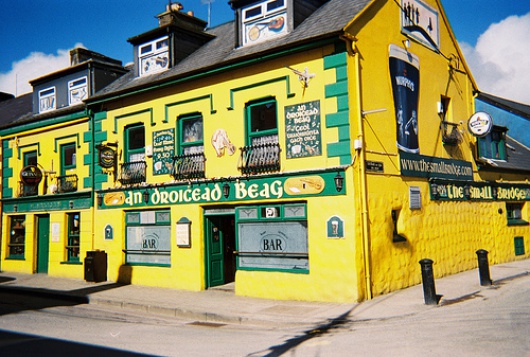
Bilingualism in Spain: a political arm
Published on
Translation by:
Paulina DominikIn a Europe of 23 official languages, there are complaints about the discrimination suffered by some due to the European policies. A recent Spanish case helps to understand the risk of politicizing the multilingualism
A so-called manifesto for a common language, published in Spain's El Mundo centre-right newspaper in July 2008, tries to defend the use of Spanish as an official language in any of the autonomous communities of Spain where bilingualism exists - the Balearic Islands, Catalonia, Galicia, the Valencian Community and the Basque Country. Support for Spanish or political campaign by means of a language? Iin 2009, one has time for and worries only about the economic crisis. Nevertheless, we are certainly talking about a typically European phenomenon.
The manifesto, backed up by European intellectuals, reveals that Spanish-speakers suffer from the shrinkage of their rights in the bilingual communities, when it comes to civil servants, in the labelling of roads, streets, buildings, and in the education system, especially in Catalonia.
Some cope better than the others
The Catalonian regional administration demands a good command of Catalan from those who aspire to a post of a civil servant. It is evident that in the labour field, bilingualism is an illusion. Javier Chicharro, a physical education supply teacher at the Macarena Institute of Seville, emphasises that it is 'impossible' for him to compete for a job in Catalonia because he cannot speak Catalan. However, he adds, a Catalan can apply without any difficulty for a post in Andalusia, since 'the required language is Spanish, the language that dominates as native. Isn’t it an injustice?' he asks. However Lali Cambra, a Catalan correspondent for the El País newspaper in South Africa, explains that public administration employees 'serve people from a certain administrative zone.' In the case of Catalonia, she adds, 'It is normal that Catalan is included as a requirement since the citizens who are administered are Catalans.'
Let’s return to the manifesto. There was a significant number of media which joined this manifesto, among them Tele5, Tele Madrid and the newspaper Abc, all of whom were accused of being 'Madrid’s centralists'. Perhaps the use of the Spanish language as a flagship of patriotism during the dictatorship of Franco has caused its defence to be associated with a 'sickly' patriotism, clarifies Sonia Cruz, editor at the television channel Antena3.
The initiative, completed by philosopher Fernando Savater, the president of Unidad Editorial (a publishing company that belongs to El Mundo) and a writer of Peruvian origin, Maria Vargas Llosa, has not been ratified by Real Academia Española (the Royal Spanish Academy), since its director, Victor García de la Concha, did not want to take a stand in the polemics with a high degree of 'politicisation'.
'The media should not interfere in the political intrigue'
Lali Cambra believes that this initiative was concluded in order to trigger an artificial debate created by the media themselves in order to be heard and cause a lot of controversy. 'No problems exist in Catalonia because of the use of Catalan or Spanish,' she explains. 'The media should not interfere in the political intrigue.'
A private company in Catalonia does not object when it comes to employing competent people, even though they might lack any knowledge of Catalan. One hardly ever has any trouble speaking Spanish in the street. It is amazing how easy it is for people to move from one language to another, indicates Pilar Solís, a journalist for El Diario de Cádiz, who is rounding up a photography course in Barcelona.
Spanish bilingualism: an example for Europe?
 Sophie Vanlommel, editor of local tabloid Het Belang Vanlimburg ('The Interest of Limburg') in Antwerp, regards Spanish bilingualism as a 'model' that should be adopted by her country. She too is bilingual, but admits that to be born in either the Flemish or the French-speaking part of Belgium marks its citizens if it comes to education and job opportunities. She admires the fact that post-Franco democracy in Spain did not allow for the creation of differentiated school circuits. 'Fortunately,' Sophie adds, one did not make any segregations and the coexistence of both languages was respected. We are either from one side or another; we have no facilities provided to learn the language of the other half of the country and if we already learn it, it is always a ‘foreign language’, never our own.'
Sophie Vanlommel, editor of local tabloid Het Belang Vanlimburg ('The Interest of Limburg') in Antwerp, regards Spanish bilingualism as a 'model' that should be adopted by her country. She too is bilingual, but admits that to be born in either the Flemish or the French-speaking part of Belgium marks its citizens if it comes to education and job opportunities. She admires the fact that post-Franco democracy in Spain did not allow for the creation of differentiated school circuits. 'Fortunately,' Sophie adds, one did not make any segregations and the coexistence of both languages was respected. We are either from one side or another; we have no facilities provided to learn the language of the other half of the country and if we already learn it, it is always a ‘foreign language’, never our own.'
Jaime Smyth, a correspondent of The Irish Times in Brussels, says that he is totally used to speaking and writing in English and Irish without distinction for any of these languages, even though Irish, he maintains , 'has not become enough powerful to enter in such kind of polemics with English.' Since English constitutes an international link with the rest of the world, everyone 'cares for its diffusion and use.' Irish 'is for the family and personal life of each of us, for interests which do not interfere with big companies, at least at the moment.'
Translated from El bilingüismo en España, arma política



